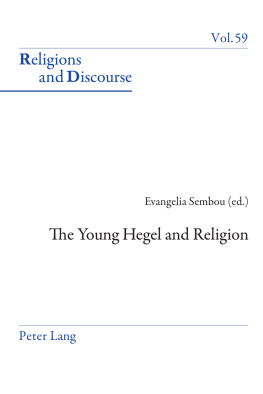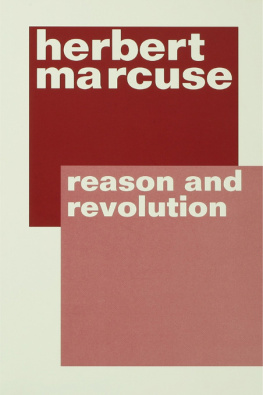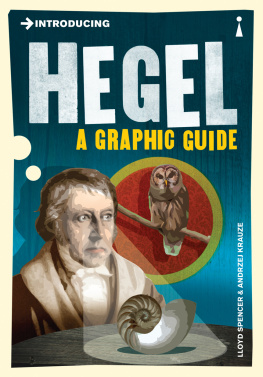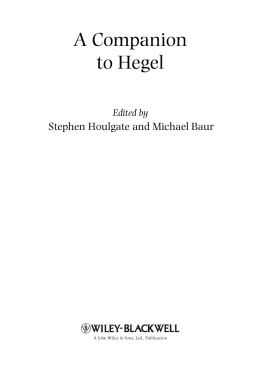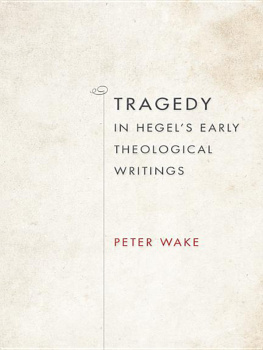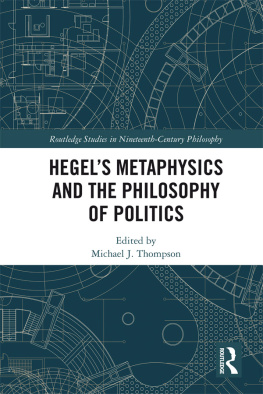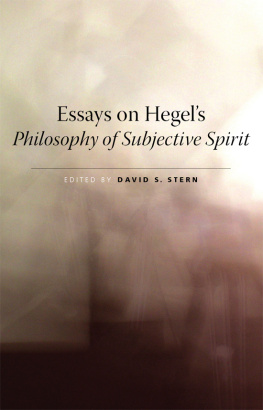Contents
Page List
Religions and Discourse
Edited by James M. M. Francis
Volume 59
PETER LANG
Oxford Bern Berlin Bruxelles Frankfurt am Main New York Wien
Evangelia Sembou (ed.)
The Young Hegel and Religion
PETER LANG
Oxford Bern Berlin Bruxelles Frankfurt am Main New York Wien
Bibliographic information published by Die Deutsche Nationalbibliothek.
Die Deutsche Nationalbibliothek lists this publication in the Deutsche Nationalbibliografie; detailed bibliographic data is available on the Internet at http://dnb.d-nb.de.
A catalogue record for this book is available from the British Library.
Library of Congress Control Number: 2017933513
ISSN 1422-8998
ISBN 978-1-78707-502-3 (print) ISBN 978-1-78707-503-0 (ePDF)
ISBN 978-1-78707-504-7 (ePub) ISBN 978-1-78707-505-4 (mobi)
Peter Lang AG 2017
Published by Peter Lang Ltd, International Academic Publishers,
52 St Giles, Oxford, OX1 3LU, United Kingdom
Evangelia Sembou has asserted her right under the Copyright, Designs and Patents Act, 1988, to be identified as Editor of this Work.
All rights reserved.
All parts of this publication are protected by copyright.
Any utilisation outside the strict limits of the copyright law, without the permission of the publisher, is forbidden and liable to prosecution.
This applies in particular to reproductions, translations, microfilming, and storage and processing in electronic retrieval systems.
This publication has been peer reviewed.
About the author(s)/editor(s)
Evangelia Sembou holds a DPhil in Politics from the University of Oxford. She has taught political theory and philosophy at several Oxford colleges as well as in the Oxford University Department for Continuing Education. She has also taught philosophy in the Faculty of Continuing Education at Birkbeck College, University of London, and has written on Hegel, political and social theory. She is the author of Modern Theories of Politics (Peter Lang, 2013).
About the book
This edited collection of essays aims to acquaint the reader with different aspects and readings of Hegels Early Theological Writings. These writings consist of five essays plus some unfinished manuscripts, unpublished by Hegel himself during his lifetime and compiled by Herman Nohl as Hegels Theologische Jugendschriften in 1907. This is the first such edited collection on these writings and will make an important contribution to Hegel scholarship.
The volume begins with an introduction on the intellectual background and an account of the Early Theological Writings. This is followed by a number of essays by both emerging and established scholars working in an international context. The essays offer a critical and/or interpretative approach to the aforesaid writings.
This eBook can be cited
This edition of the eBook can be cited. To enable this we have marked the start and end of a page. In cases where a word straddles a page break, the marker is placed inside the word at exactly the same position as in the physical book. This means that occasionally a word might be bifurcated by this marker.
| vii
I wish to thank Dr James Francis, the series editor, for accepting this collection as part of Peter Langs Religions and Discourse series. I am also grateful to Jasmin Allousch, programme assistant, Emma Clarke, assistant editor, Alice Emmott, editorial assistant, and Lucy Melville, publishing director, at Peter Lang for their assistance. The index was prepared by David Rudeforth.
| 1
This volume contains chapters by a group of scholars on Hegels Theologische Jugendschriften. I decided to pursue this project because, so far, no edited collection has appeared on Hegels juvenilia. Therefore, the book will, I hope, fill a gap in the literature on Hegel, in general, the young Hegel, in particular.
Mikkel Flohr concentrates on The Tbingen Fragment in Chapter 1. In particular, he focuses on the idea of popular religion (Volksreligion), which, Flohr argues, Hegel uses in order to both illustrate and criticize Kants moral philosophy. Popular religion is a subjective religion, that is, a living set of principles which inform all human life and conduct. Popular religion is also the vehicle for the general education of humankind. In challenging Kants dualism, popular religion contributes to a shift from Kants moral philosophy to normative social theory.
In Chapter 2, Domagoj Vujeva deals with Hegels critique of Christianity, while problematizing the republican character of his early political theory. Christianity lost its initial pure character when it became institutionalized as a state religion. As a state religion, Christianity ceased to be a religion of moral teaching. Hegels republicanism is inspired by Greek antiquity, specifically the poleis as ethico-political communities wherein human freedom thrived. For Hegel, the modern phenomena of individualism, private property and social differentiation are due to the disintegration of these ethico-political communities. In this way, Hegel contrasts antiquity to modern times.
In Chapter 3, Mara del Rosario Acosta Lpez addresses the relation between abstraction and violence through an in-depth analysis of the concept of positivity in Hegels Early Theological Writings. The author argues that, in his development of the notion of the positivity of religion in his Tbingen, Bern and Frankfurt periods, Hegel produces powerful 1 | 2 philosophical tools for understanding the two kinds of violence that result from the immediate (positive) translation of abstract forms of thought into concrete historical realities (p. 94). Having demonstrated that these two kinds of violence are initially formally delineated in Hegels definition and analysis of the concept of positivity, Lpez turns to the way in which they acquire a concrete ethico-political meaning in The Spirit of Christianity and Its Fate. Hegels criticism of the violence of law offers a useful analysis of the forms of historical violence that stem from a modern interpretation of the notion of sovereignty.
Peter Wakes contribution in Chapter 4 first discusses Hegels rupture with Kantianism that is anticipated in The Positivity of the Christian Religion essay and that comes out fully blown in The Spirit of Christianity and Its Fate essay. He suggests that The Positivity of the Christian Religion essay is best read in terms of a tension that is latent between (a) Hegels early Kantianism that aspired to establish a religious form that would bridge the gap between the human capacity for rational self-determination and its concrete realization, and (b) his commitment to an ideal of unification in beauty which he owes to the notion of folk-religion, itself based on his ideal of the ancient Greek community. Wakes contention is that the young Hegel aspires to a form of immanent transcendence that leads him to a break with Kantian practical philosophy.
In Chapter 5, W. Clark Wolf examines the role of the concept in Hegels Early Theological Writings, especially in The Spirit of Christianity and Its Fate essay. Specifically, the young Hegel sets up the concept as the universal element in law and opposes it to life and reality. Reconcilability marks Hegels articulation of an ethics beyond law, where life overcomes the concept. In The Spirit of Christianity and Its Fate essay Hegel, Wolf argues, uses a post-Pauline opposition of law and life.

